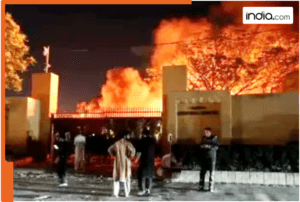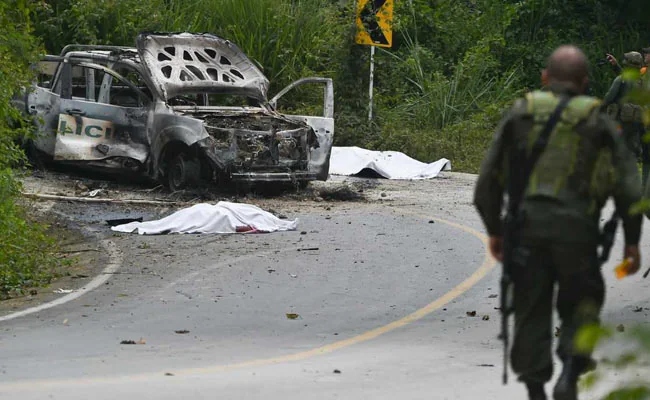A massive oil spill in the Black Sea has prompted Russia to declare a federal emergency, marking one of the region’s worst environmental disasters in recent years. The spill, involving approximately 3,700 tons of low-grade fuel oil, has already had devastating effects on marine life, local ecosystems, and nearby coastal communities. This crisis underscores the vulnerabilities of aging maritime infrastructure and the environmental risks of severe weather conditions.
What Happened: A Timeline of the Incident
The catastrophe unfolded on December 15, 2024, when two aging Russian oil tankers encountered a severe storm while navigating the Kerch Strait, near the Crimean Peninsula. The first tanker, carrying thousands of tons of fuel oil, split in half due to structural damage. The second vessel ran aground, exacerbating the spill. Both tankers were reportedly not equipped with modern safety mechanisms, raising questions about compliance with maritime safety standards.
Within hours, a significant volume of oil began leaking into the Black Sea, forming a slick that spread rapidly due to strong winds and currents. Authorities initially underestimated the severity of the spill but quickly escalated their response as the environmental damage became evident.
Russia Declares Federal Emergency
Recognizing the scale of the disaster, Russia declared a federal emergency, a status that allows for mobilizing national resources and coordinating efforts across multiple agencies. The emergency declaration covers the Krasnodar region, including popular tourist destinations such as Anapa and the Temryuk districts, which have been heavily impacted by the spill.
President Vladimir Putin has ordered an investigation into the incident and called for urgent measures to mitigate the environmental fallout. Cleanup operations are being led by the Russian Ministry of Emergency Situations, with over 10,000 personnel deployed to contain the spill and rehabilitate affected areas. Despite these efforts, adverse weather conditions have hampered containment, allowing the oil to continue washing ashore.
Environmental Impact: A Grim Outlook
The spill has already caused extensive damage to the Black Sea’s delicate ecosystem. Beaches in Anapa, a renowned resort area, are now coated in oil, rendering them inaccessible and harmful to visitors. Marine life, including seabirds, dolphins, and porpoises, has been severely affected. Rescuers have reported finding dozens of dead and oil-coated animals along the coastline.
Local fishermen have also been hit hard, with fishing activities suspended indefinitely. “The sea is our livelihood, and now it’s poisoned,” lamented a fisherman from the Krasnodar region. The spill’s long-term impact on the region’s biodiversity and economy remains a growing concern.
Challenges in Cleanup Operations
The scale of the cleanup effort is monumental. Oil booms, skimmers, and dispersants are being employed to contain and remove the oil. However, rough seas and strong winds have complicated these efforts. Volunteers and local residents have joined forces with official agencies, working tirelessly to clean the affected beaches and rescue wildlife.
Environmental organizations have criticized the Russian government for what they describe as a delayed and inadequate response. “This disaster highlights the urgent need for stricter regulations and better preparedness to handle such crises,” said an environmentalist from Greenpeace Russia.
International Reactions and Calls for Action
The international community has expressed solidarity with Russia while emphasizing the importance of environmental accountability. Neighboring countries along the Black Sea, including Turkey, Bulgaria, and Ukraine, are closely monitoring the spill for potential cross-border impacts. The United Nations has called for a thorough investigation and has offered technical assistance to manage the crisis.
China, a key economic partner of Russia, has offered to provide advanced cleanup technology. Meanwhile, global environmental organizations have urged Russia to take decisive action to prevent future spills, including upgrading its maritime fleet and enforcing stricter safety protocols.
The Human Cost
Beyond environmental damage, the spill has disrupted the lives of thousands of coastal residents. Tourism, a significant source of income for the Krasnodar region, has come to a standstill. Many local businesses, including hotels and restaurants, are bracing for significant losses as visitors cancel their plans.
Health concerns are also mounting. Exposure to oil and its fumes poses risks to cleanup workers and residents. Authorities have advised people to avoid the affected areas and are distributing protective gear to those involved in cleanup operations.
A Wake-Up Call for Maritime Safety
The Black Sea oil spill is a stark reminder of the risks posed by aging maritime infrastructure. Both tankers involved in the incident were decades old, raising questions about their seaworthiness. Experts have long warned that Russia’s maritime fleet is in dire need of modernization to prevent such disasters.
In response to the spill, the Russian government has announced plans to audit all vessels operating in its waters. However, critics argue that such measures often come too late, with real change requiring a comprehensive overhaul of policies and enforcement mechanisms.
Conclusion: Turning Crisis into Opportunity
As Russia grapples with the aftermath of this environmental disaster, there is an opportunity to learn and improve. Strengthening maritime safety regulations, investing in modern infrastructure, and prioritizing environmental conservation can help prevent future incidents.
The loss of 3,700 tons of oil into the Black Sea is a sobering reminder of the delicate balance between human activity and nature. While the immediate focus is on cleanup and recovery, the broader goal must be to ensure that such a crisis never happens again. The world is watching, and the stakes couldn’t be higher.
Also Read- 1. 19 Soldiers Killed in Pakistan-Afghanistan Border Clash: Rising Tensions Unfold
2. “1 Rule Break That Led to Magnus Carlsen’s Shocking Exit from Chess Championship”
Reference- To Know More Click Here.




















2 thoughts on “3,700 Tons of Oil Spill in Black Sea: Russia Declares Emergency Amid Environmental Crisis”